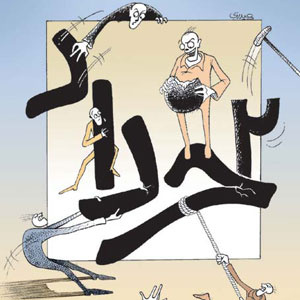Diazepam
How are reformists going to react to the election results?

The official news released by Ministry of Interior introduces Mahmoud Ahmadinejad as the re-elected presidential of Iran for another four years. His victory appears so sweeping that precludes any doubt and rendering participation of many citizens useless, has impelled them to remain at home, inactive.
When last week the hard-line newspaper Keyhan chose a promising headline for its principlist readers assuring them of victory one week before the elections (!) many considered it as a psychological warfare and said that Keyhan is trying to create a tense election atmosphere. Another reading of the headline was that Keyhan is presaging what is intended to come out of the ballot boxes.
The final result of the elections is 24.5 million votes for Ahmadinejad and 13.2 million for his major challenger, Mir Hosein Musavi.
While many believed that the government’s weak record and Ahmadinejad’s diatribes against well-known figures of the Islamic Republic in his debates shows that he has accepted defeat, and the state-run TV is making its last efforts to uphold him giving him a last chance to defend himself against criticisms, despite people’s massive, unprecedented participation in the elections once again Ahmadinejad’s name came of the ballots to allow him steer Iran’s affairs for another presidential term.
It is too soon to analyze Iran’s future and the credit its leaders gained with people’s massive turnout. What is unclear yet is the way reformists are going to react to this defeat. Will they admit it? Will they doubt it? Will judicial entities enter the elections?
The future of the reform movement –if no protests and reactions occur- will also become uncertain. The future status of this political movement in Iran can be figured out only when we passed the current chaotic situation. In general, the entire spectrum of Iranian political groups, from moderate conservatives to reformists and other opposition groups will face a transformation.
What is clear is that the tenth presidential elections gave a clear answer to many problems within the current political arrangement of Iran. The world will witness another Iran after June 12th and Iran is going to move inside a new track.
Democracy, economic growth, international status and most important of all democracy call for a new thought. The Iranian society is in a coma at present and the celebrations held by Ahmadinejad supporters can not be compared with reformists’ sporadic gatherings in the nights leading to the elections.
The result of elections has thrown supporters of reformist candidates (Karrubi and Musavi) in a state of shock. The political death of reformists’ is extremely suspicious and apparently no impartial entity is willing to investigate the story. Diazepam is available for those who suffer shock. Do reformists and their supporters (who hold some positions in the power) go for a collective suicide, or choose diazepam and wait for future?
When last week the hard-line newspaper Keyhan chose a promising headline for its principlist readers assuring them of victory one week before the elections (!) many considered it as a psychological warfare and said that Keyhan is trying to create a tense election atmosphere. Another reading of the headline was that Keyhan is presaging what is intended to come out of the ballot boxes.
The final result of the elections is 24.5 million votes for Ahmadinejad and 13.2 million for his major challenger, Mir Hosein Musavi.
While many believed that the government’s weak record and Ahmadinejad’s diatribes against well-known figures of the Islamic Republic in his debates shows that he has accepted defeat, and the state-run TV is making its last efforts to uphold him giving him a last chance to defend himself against criticisms, despite people’s massive, unprecedented participation in the elections once again Ahmadinejad’s name came of the ballots to allow him steer Iran’s affairs for another presidential term.
It is too soon to analyze Iran’s future and the credit its leaders gained with people’s massive turnout. What is unclear yet is the way reformists are going to react to this defeat. Will they admit it? Will they doubt it? Will judicial entities enter the elections?
The future of the reform movement –if no protests and reactions occur- will also become uncertain. The future status of this political movement in Iran can be figured out only when we passed the current chaotic situation. In general, the entire spectrum of Iranian political groups, from moderate conservatives to reformists and other opposition groups will face a transformation.
What is clear is that the tenth presidential elections gave a clear answer to many problems within the current political arrangement of Iran. The world will witness another Iran after June 12th and Iran is going to move inside a new track.
Democracy, economic growth, international status and most important of all democracy call for a new thought. The Iranian society is in a coma at present and the celebrations held by Ahmadinejad supporters can not be compared with reformists’ sporadic gatherings in the nights leading to the elections.
The result of elections has thrown supporters of reformist candidates (Karrubi and Musavi) in a state of shock. The political death of reformists’ is extremely suspicious and apparently no impartial entity is willing to investigate the story. Diazepam is available for those who suffer shock. Do reformists and their supporters (who hold some positions in the power) go for a collective suicide, or choose diazepam and wait for future?

